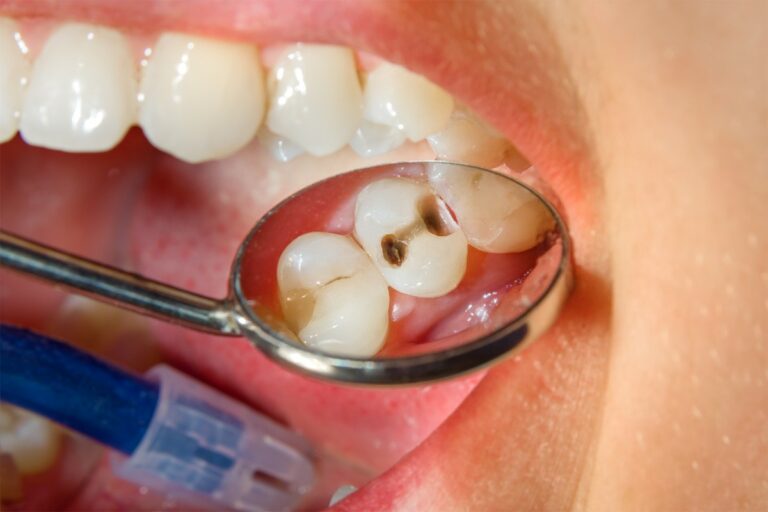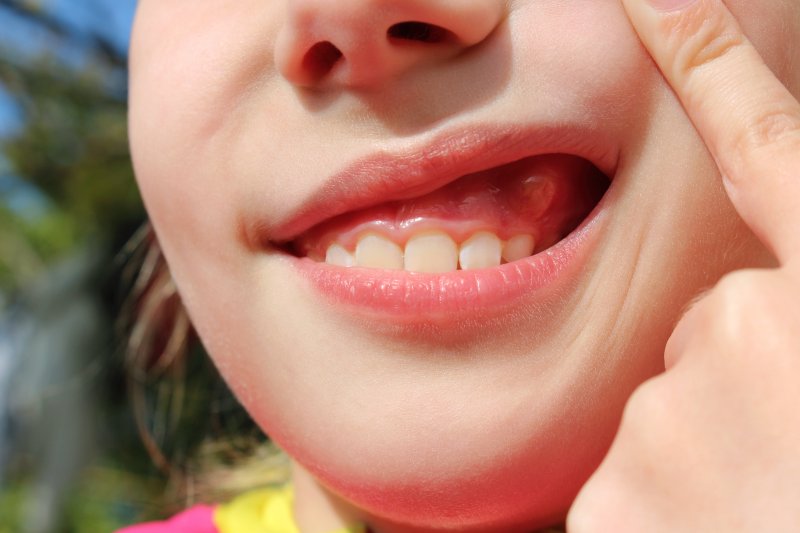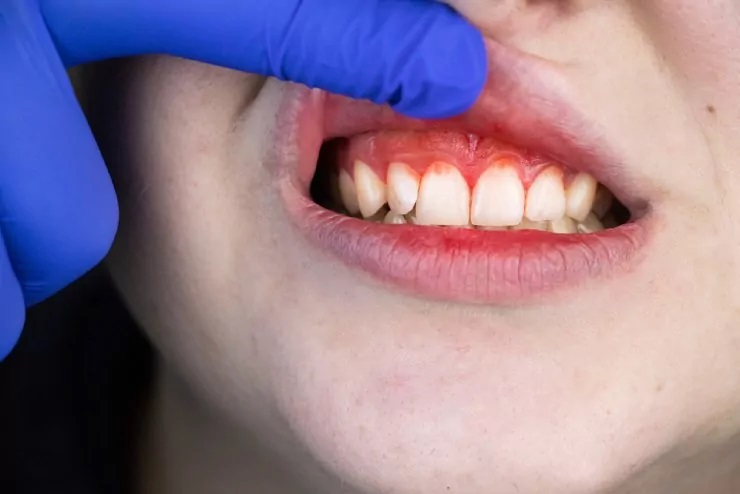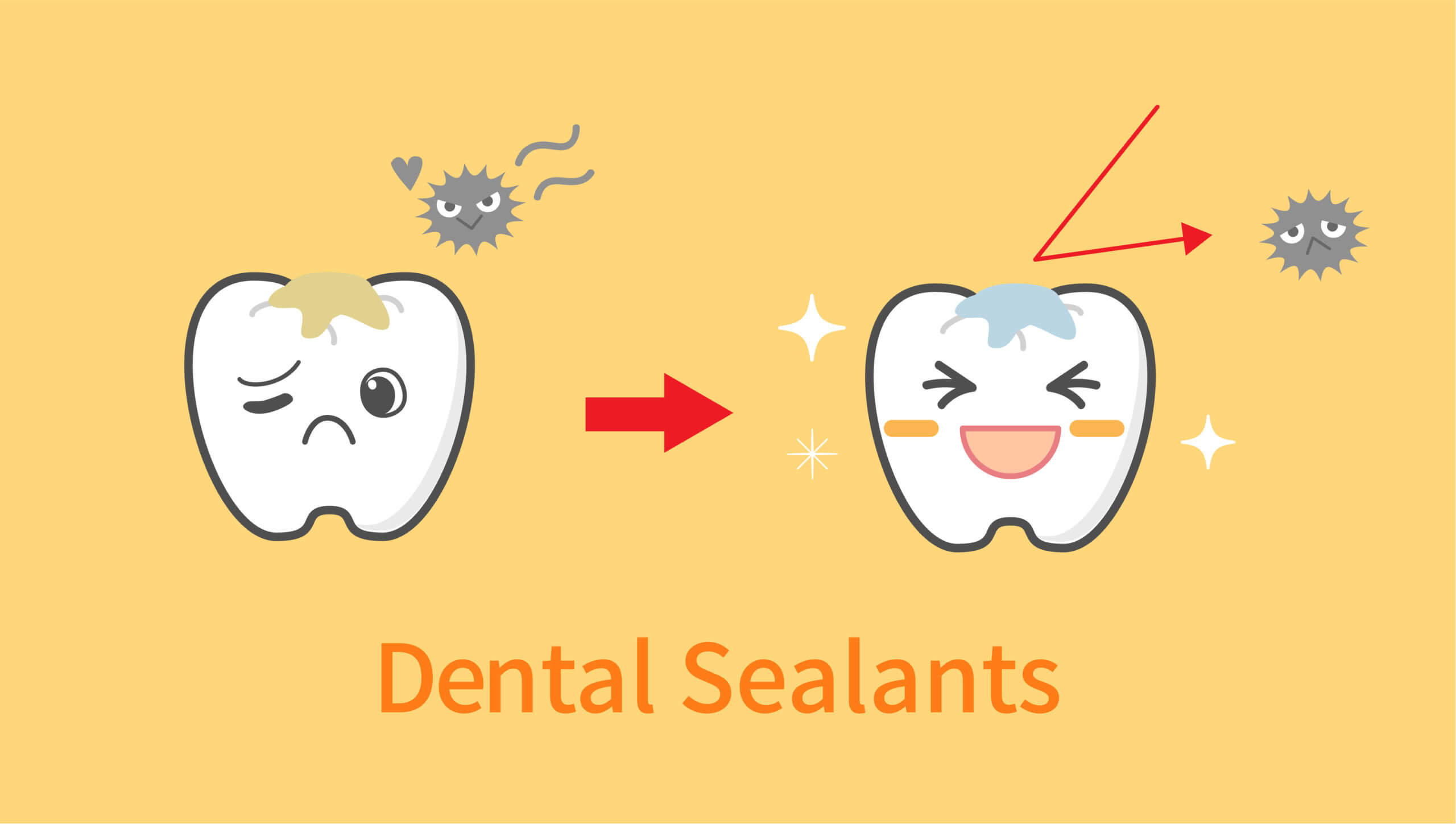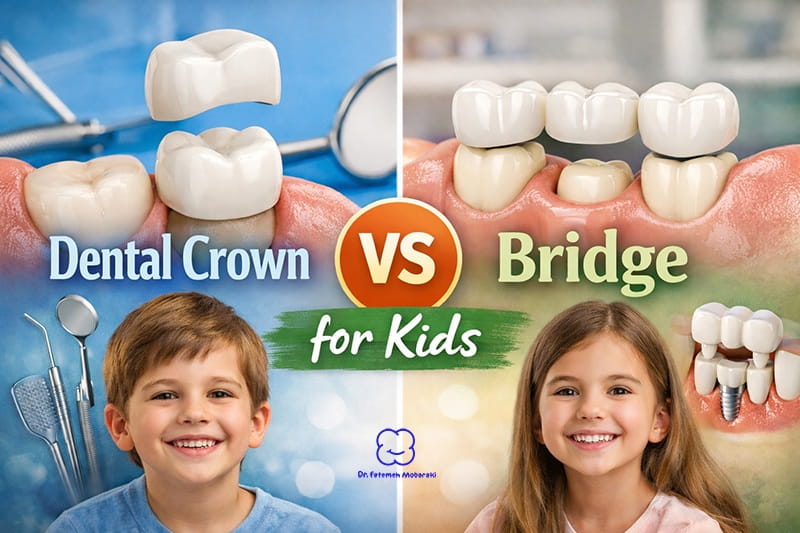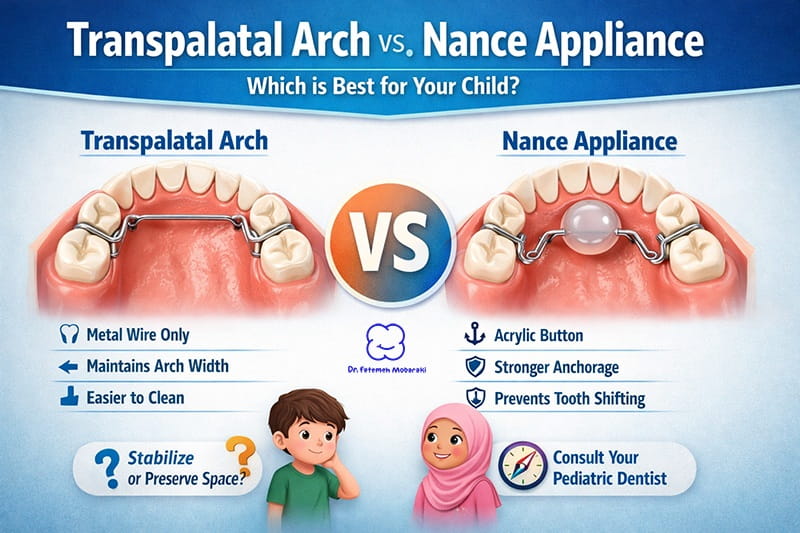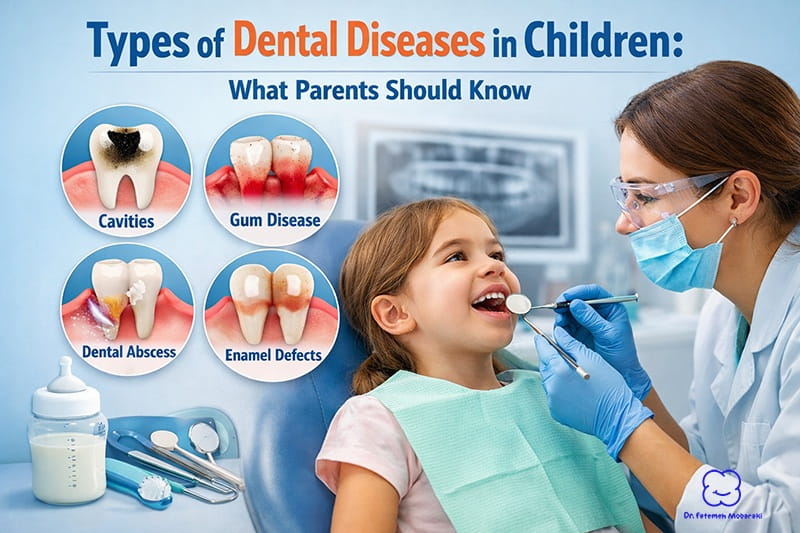Dental cavities in children, are one of the most prevalent dental issues affecting kids around the world. Cavities in kids occur when bacteria in the mouth produce acids that attack the tooth enamel, leading to holes or openings in the teeth. If left untreated, cavities can cause pain, infection, and even lead to long-term oral health issues. As a parent, understanding the causes, symptoms, and preventive measures for cavities in kids is essential for maintaining your child’s oral health.
What Are Dental Cavities in Children?
Dental cavities in children are holes or structural damage in the teeth resulting from prolonged acid attacks. These acids are produced by bacteria that feed on sugars and starches from the food and drinks consumed by children. Over time, this acid erodes the enamel, forming cavities.
Causes of Dental Cavities in Children
Several factors contribute to the development of dental cavities in children:
- Poor Oral Hygiene: Failing to brush and floss regularly allows plaque, a sticky film of bacteria, to accumulate on the teeth. This plaque produces acids that cause cavities.
- Frequent Consumption of Sugary Foods and Drinks: Children who consume sugary snacks, candies, juices, or sodas frequently are at a higher risk of developing cavities. Bacteria in the mouth feed on sugars, creating acids that erode the tooth enamel.
- Constant Snacking: Continuous snacking, especially on sugary or starchy foods, provides a constant food source for bacteria, increasing the risk of cavities in kids.
- Bottle Feeding at Night: Allowing children to sleep with a bottle containing milk, formula, or juice exposes their teeth to sugars for extended periods, leading to “baby bottle tooth decay.”
- Insufficient Fluoride Exposure: Fluoride strengthens the enamel and makes it more resistant to acid attacks. Lack of fluoride exposure increases the risk of cavities in children.
- Genetics: Some children are genetically predisposed to dental cavities due to factors such as softer enamel, deeper grooves on the teeth, or saliva composition.
Signs and Symptoms of Dental Cavities in Children
Identifying cavities early can prevent more serious dental problems. Common signs of cavities in kids include:
- White, brown, or black spots on the teeth
- Visible holes or pits in the teeth
- Sensitivity to hot, cold, or sweet foods
- Pain when chewing or biting
- Bad breath or an unpleasant taste in the mouth
- Swelling or redness in the gums around the affected tooth
If you notice any of these symptoms, it’s essential to visit a pediatric dentist for a thorough examination.
The Stages of Dental Cavity Development in Kids
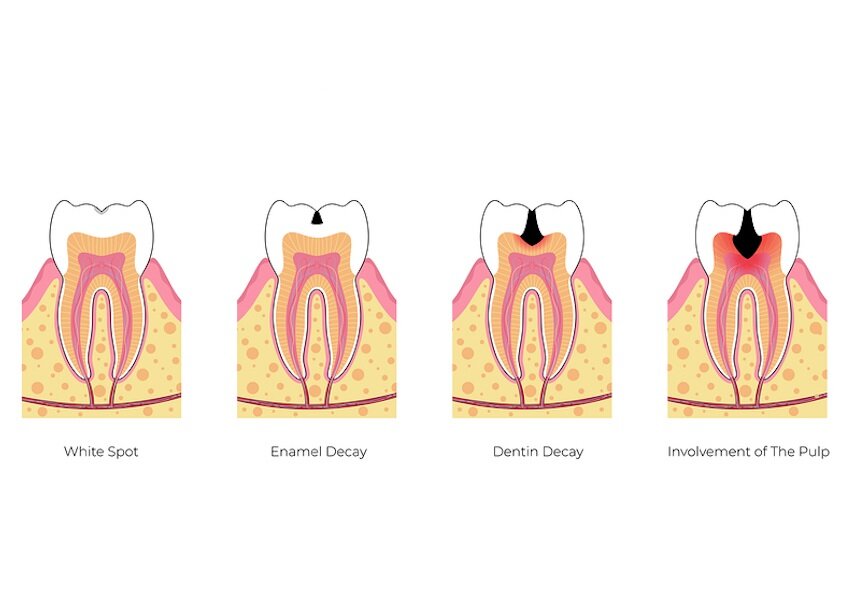
Understanding the progression of cavities helps in identifying and treating them early:
- Initial Demineralization: The enamel loses minerals, and white spots appear on the tooth surface, indicating the beginning of cavity formation.
- Enamel Decay: The enamel continues to break down, and the surface of the tooth softens, forming a small cavity.
- Dentin Decay: As the cavity progresses, it reaches the dentin layer (the softer tissue beneath the enamel), causing pain and sensitivity.
- Pulp Damage: The decay reaches the pulp (the inner part of the tooth containing nerves and blood vessels), leading to severe pain and the risk of infection or abscess formation.
Prevention of Dental Cavities in Children
Preventing cavities in kids is possible with consistent oral care habits and regular dental visits. Here’s how to protect your child’s teeth from dental cavities:
- Establish a Daily Oral Hygiene Routine: Teach your child to brush their teeth twice a day with fluoride toothpaste. For children under three, use a smear of toothpaste, and for those over three, use a pea-sized amount.
- Flossing: Start flossing your child’s teeth once they have two teeth that touch. Flossing removes food particles and plaque from between the teeth, reducing the risk of cavities.
- Limit Sugary and Starchy Foods: Reduce the intake of sweets, candies, cookies, and sugary drinks. Encourage healthier snack options like fresh fruits, vegetables, cheese, and nuts.
- Avoid Bedtime Bottles: If your child needs a bedtime bottle, fill it with water instead of milk, juice, or formula to prevent prolonged exposure to sugars.
- Ensure Adequate Fluoride Exposure: Use fluoride toothpaste and ensure your child drinks fluoridated water. Consider professional fluoride treatments from a dentist for extra protection.
- Regular Dental Check-Ups: Schedule dental visits every six months. A pediatric dentist can monitor your child’s oral health, provide professional cleanings, and detect early signs of cavities.
- Dental Sealants: Ask your dentist about applying sealants to your child’s molars. Sealants are protective coatings that cover the chewing surfaces, preventing cavities by blocking food particles and bacteria.
Treatment Options for Dental Cavities in Children
If your child develops a cavity, there are several treatment options available:
- Fluoride Treatments: For early-stage cavities, fluoride treatments can help remineralize the enamel and reverse the damage.
- Dental Fillings: If the cavity has progressed, the decayed portion of the tooth is removed, and a filling material (such as composite resin or glass ionomer) is used to restore the tooth’s structure.
- Crowns: When a cavity is extensive, a crown may be placed over the tooth to protect it. Stainless steel crowns are commonly used for baby teeth, while porcelain crowns are used for permanent teeth.
- Pulpotomy or Root Canal: If the decay reaches the pulp, a pulpotomy (partial removal of the pulp) or root canal (complete removal of the pulp) may be necessary. The tooth is then restored with a crown.
- Tooth Extraction: In severe cases, where the tooth cannot be saved, tooth extraction is necessary. A space maintainer may be placed to ensure proper alignment of the remaining teeth.
Why Is Preventing Dental Cavities in Kids Important?
Preventing cavities in kids is crucial because early dental health impacts overall health, confidence, and future dental habits. Untreated cavities can lead to pain, infection, difficulty eating, and even issues with speech development. Additionally, children who develop cavities in their baby teeth are more likely to experience cavities in their permanent teeth.
Tips for Encouraging Good Oral Hygiene Habits in Children
- Make Brushing Fun: Use toothbrushes with your child’s favorite cartoon characters or play their favorite song while brushing.
- Set a Good Example: Brush and floss together as a family to make it a regular habit.
- Reward System: Create a reward chart for maintaining good oral hygiene practices, such as brushing twice a day or eating fewer sugary snacks.
- Use Educational Videos and Books: Teach your child about the importance of dental care using videos and books designed for kids.
The Role of a Pediatric Dentist in Preventing Cavities in Kids
Pediatric dentists specialize in treating dental cavities in children and educating parents on preventive care. Regular visits to a pediatric dental clinic can help identify issues early, provide fluoride treatments, and offer guidance on maintaining oral hygiene.
Conclusion
Dental cavities in children are a common but preventable problem. By understanding the causes, symptoms, and treatment options, parents can take proactive steps to protect their child’s dental health. Encouraging good oral hygiene habits, providing a balanced diet, and scheduling regular visits to a pediatric dentist can prevent cavities and ensure that your child enjoys a healthy, beautiful smile.
If you’re looking for expert care, our pediatric dental clinic in Mirdif, Dubai, offers comprehensive services to treat and prevent cavities in kids. Schedule an appointment today to give your child the best dental care possible.
FAQ
What causes dental cavities in children?
Cavities in children are caused by bacteria that feed on sugars from food and drinks, producing acids that erode tooth enamel.
How can I tell if my child has a cavity?
Common signs include tooth pain, sensitivity to hot or cold foods, visible holes or discoloration, and swelling around the gums.
Can cavities in baby teeth affect permanent teeth?
Yes, untreated cavities in baby teeth can lead to infection, misalignment, or damage to developing permanent teeth.
How can I prevent dental cavities in my child?
Ensure proper brushing and flossing, limit sugary snacks, provide fluoride, and schedule regular dental check-ups.

